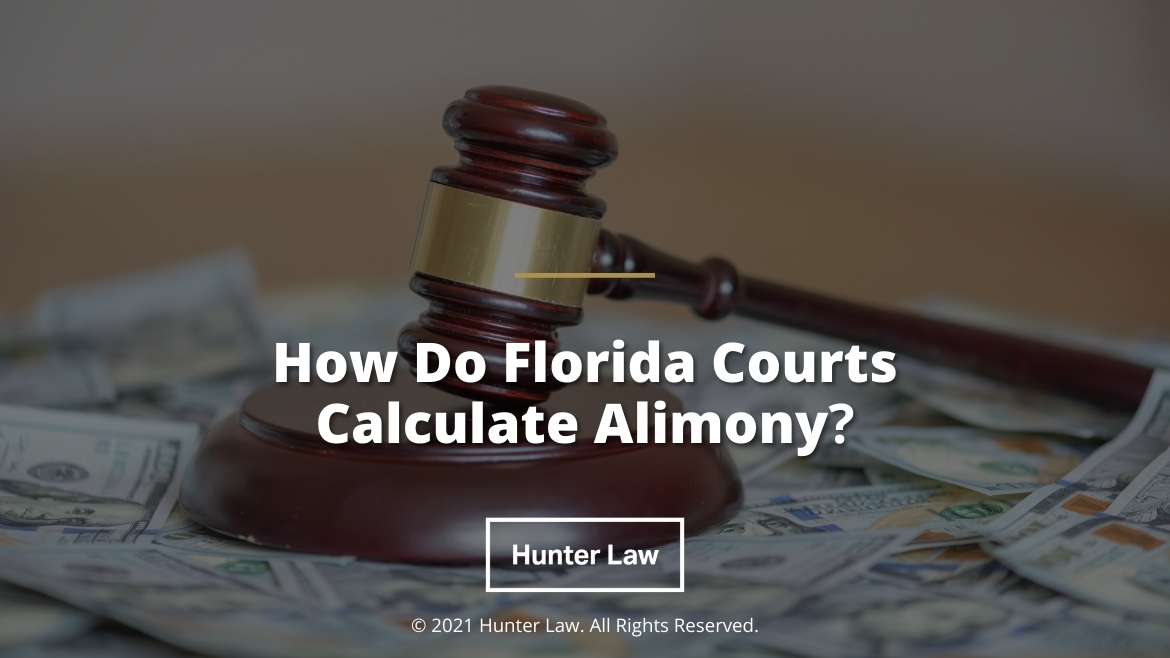Alimony is a court-ordered payment from one spouse to the other, and no two divorce cases are ever the same. In general, alimony in Florida is awarded to the lower income-producing spouse to maintain their current standard of living.
In the eyes of Florida Courts, either spouse may file for a dissolution of marriage. The filing spouse must show that the marriage is irretrievably broken.
The elite group of attorneys from Hunter Law should be the only ones to handle the complexities of your Florida divorce. (813) 287-2227.
A divorce is a disruptive event for any household, and its result can last a lifetime. Florida has specific laws and circumstances controlling how much alimony is granted and for how long. A Florida Judge is permitted a wide latitude to ensure a divorce is fair for both spouses.
The following post highlights five types of settlements available to Florida couples and the alimony considerations a judge must adhere to.
- Florida Allows Five Types of Alimony Settlements
- Calculating Alimony
- Who Gets The House?
- Final Word
Florida courts’ main goal is to make sure the financial strain of dissolution is not relegated to only one person. Alimony is based on one spouse’s need and the other spouse’s capacity to pay. Several factors go into calculating an alimony settlement. If there are any questions or concerns, contact Hunter Law at (813) 287-2227.
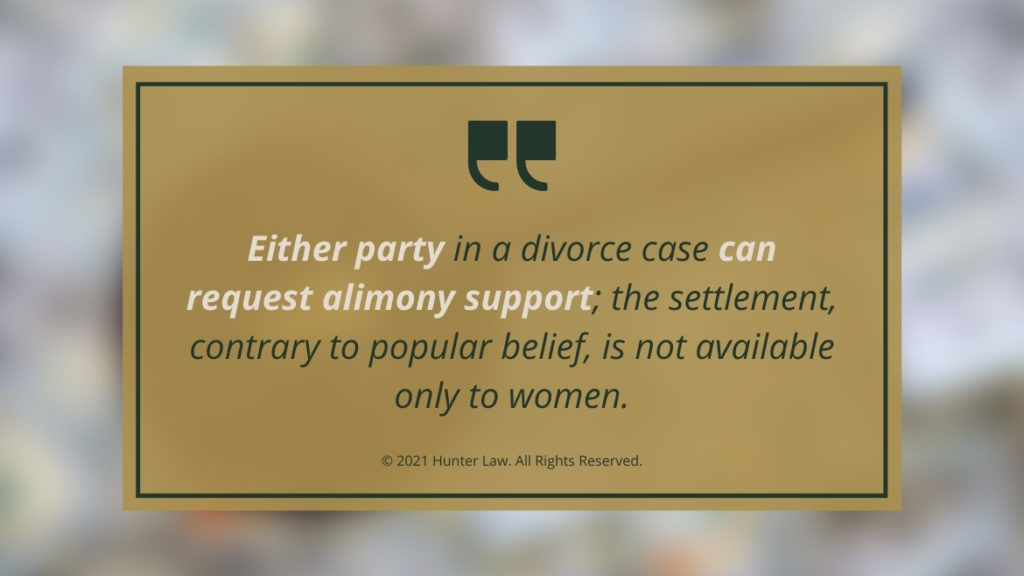
Florida courts have a great deal of flexibility in calculating a fair payment for the lower income-producing spouse, with several guidelines to consider. However, settlements are always on a case-by-case basis. The amount and length are primarily up to a judge’s discretion.
The judge decides how much alimony to award and how long the payments will continue.
Make sure your interests are represented. Skilled attorneys at Hunter Law have the expertise to navigate any size divorce procedure, (813) 287-2227
Five Types of Alimony Settlements
- Temporary settlement provides for the lower-earning spouse during court proceedings. This type of alimony ends when the divorce is settled.
- Bridge-the-Gap awards help a spouse meet short-term financial obligations. Bridge-the-Gap alimony cannot extend past two years and ends when the paying spouse dies or the supported spouse remarries.
- Rehabilitative support allows a spouse the opportunity to redevelop skills and re-enter the workforce. The court must approve a specific plan of action for this type of award.
- Durational alimony is time-limited support. If the spouse does not qualify for permanent alimony, the courts may award support to last no longer than the length of the marriage.
- Permanent alimony was eliminated in the state of Florida effective July 1, 2023. The new law signed by Governor DeSantis does not affect those receiving this *type of alimony before the law became effective.
Couples can negotiate the terms, type, and length of the alimony. If they cannot agree, then the judge will step in, evaluate the facts, and set the award.
Either party in a divorce case can request alimony support; contrary to popular belief, the settlement is not available only to women.
What Is the Difference Between Spousal Support and Alimony in Florida?
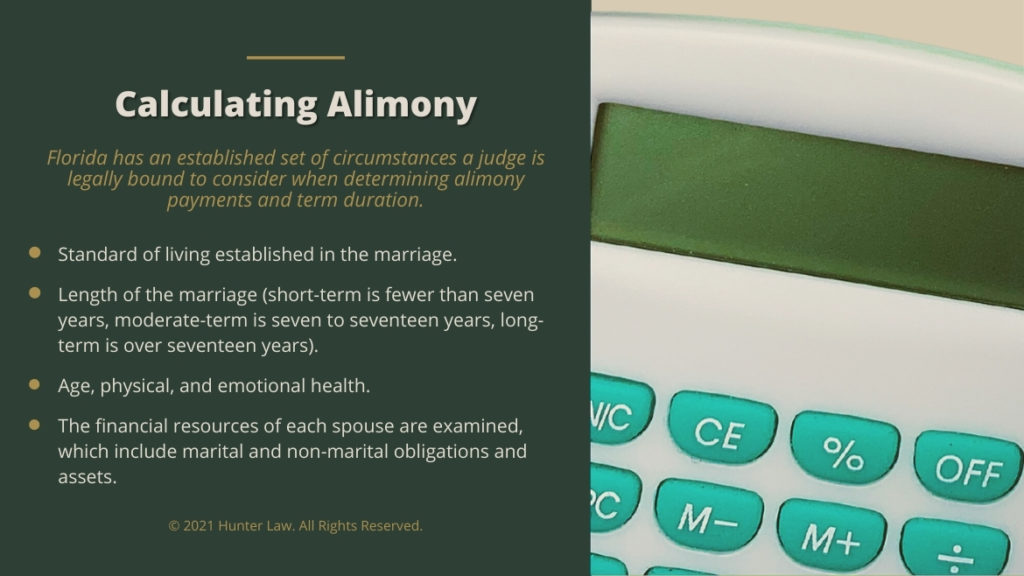
Calculating Alimony
Florida has an established set of circumstances a judge must consider when determining alimony payments and term duration. These components are outlined by Florida Statute 61.08. One or all factors may be considered when setting an alimony award.
The Courts May Examine the Following:
- Standard of living established in the marriage.
- Length of the marriage (short-term is fewer than seven years, moderate-term is seven to seventeen years, long-term is over seventeen years).
- Age, physical, and emotional health.
- The financial resources of each spouse are examined, which include marital and non-marital obligations and assets.
Who Gets the House?
Florida operates under the “equitable distribution” of marital property. This concept means property gained during the marriage; courts will try to bring about fair distribution. Courts consider the duration of the marriage, the value of the property, and each spouse’s contribution.
A Judge may order one spouse the home in exchange for the other spouse buying out their equity. Florida courts also have the option to allow a spouse to live in the home temporarily if this seems like a fair decision.
If a compromise cannot be reached, a judge may order the house to be sold and distribute proceeds equally. If children are involved, this weighs on the court’s decision on which spouse is awarded the home.
Only marital assets and liabilities are divided in a divorce case. Florida law has a powerful premise that all property belongs to both spouses under the concept of “tenants by the entireties” with rights of survivorship. This legal premise is only available to married couples.
Alimony and Child Support Lawyers: Securing Fair Support Agreements in Florida
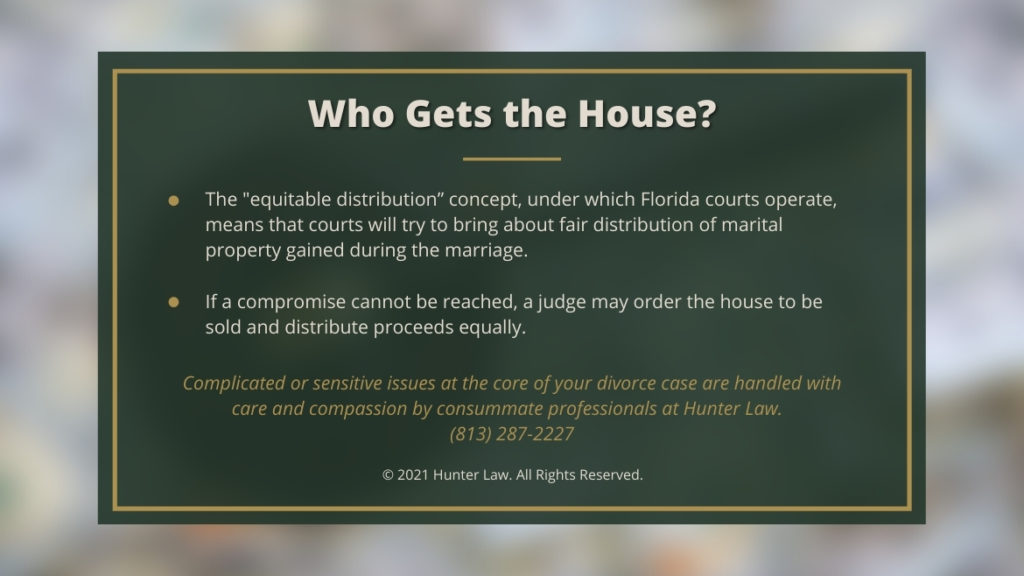
Complicated or sensitive issues at the core of your divorce case are handled with care and compassion by consummate professionals at Hunter Law (813) 287-2227
The Judge May Also Consider
- Earning capacity for each spouse, educational and vocational achievement, and employability. If relevant, the time for either spouse to gain the education required to enter the workforce.
- Contributions to marriage such as homemaking, childcare education, career-building are examined. Florida courts also consider obligations to a minor child.
- Tax consequences.
- All sources of revenue for both spouses.
- Any factor the court deems necessary.
Seek the counsel of an experienced group of attorneys from Hunter Law. (813) 287-2227
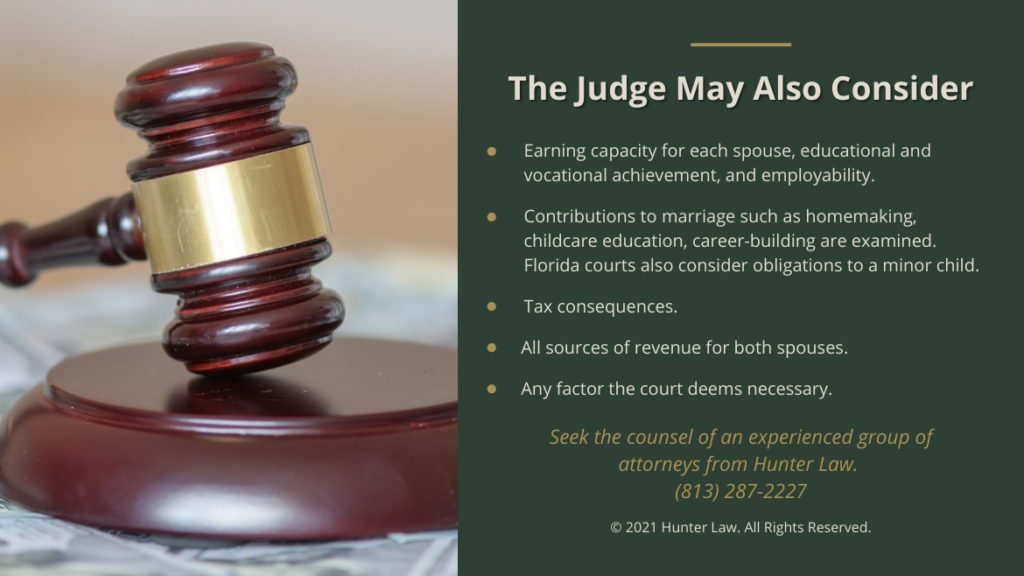
Final Word
No other legal process can be as convoluted or problematic as a divorce case. A divorce can culminate in years of distrust, contempt, and, in most situations, loathing. Ending a marriage can also close out a mistake.
If a marriage is headed for divorce, it is essential to protect one’s own interests and any children. Always consider how property is titled and how your cash is handled.
Are your interests protected? The Family Law attorneys at Hunter Law are here and ready to help you. Call us today!


